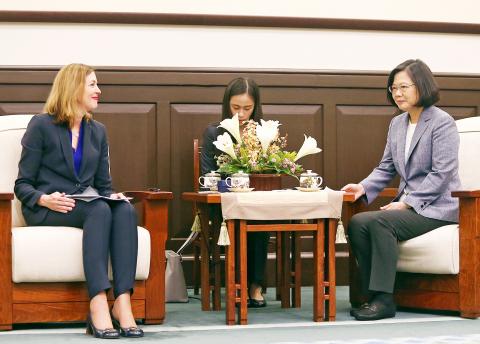Taiwan is to work more closely with the US on defense and other exchanges as China unilaterally destabilizes regional peace, President Tsai Ing-wen (蔡英文) said yesterday in a meeting with US officials.
Tsai met with American Institute in Taiwan (AIT) Chairman James Moriarty at the Presidential Office Building, where they discussed shared ideas about democracy and talked about the enduring Taiwan-US relationship.
Tsai thanked the US and other nations of “similar [political] philosophies” for their support as Taiwan faces the challenges presented by Chinese aggression.

Photo: CNA
Taiwanese were deeply touched by Washington and others speaking up on Taiwan’s behalf when China pressured international airlines to change Taiwan’s designation on their Web sites, she said.
The nation would continue to work closely with the US for the benefit of the people of both nations, and would face challenges to regional peace and stability together, Tsai said, adding that the US has a special understanding of the situation facing Taiwan.
Tsai, who attended Tuesday’s dedication of the new AIT compound in Taipei’s Neihu District (內湖), said the structure is symbolic of the enduring relationship between the two nations, which “becomes ever more resolute with the passing of time.”
The compound — which cost US$255.6 million — was an investment in the two nations’ relationship by the US, she said.
Tsai quoted Moriarty as saying in a speech at Stanford University last month that Taiwan serves as a successful example of democracy not only for the region, but the entire world, adding that the relationship between the two nations has its foundation in shared democratic values.
Tsai also thanked the US for approving US military contractors to sell components to Taiwan for its domestic submarine program, and said that Taiwan would work closely with the US on regional defense in the face of heightened tensions caused by increased Chinese military activity.
Moriarty said that from the passage of the Taiwan Travel Act in March, people could see that the US was fully committed to fulfilling its promises to Taiwan.
The US would unceasingly strive to guarantee Taiwan’s ability to have a voice in international contexts, he said.
Tsai also spoke with US Assistant Secretary of State for Educational and Cultural Affairs Marie Royce at the Presidential Office Building.
Tsai said she was happy to see Royce again, who she described as an old friend, adding that Royce’s visit represented the US’ support for Taiwan.
From 2016 to last year, 21,516 Taiwanese students attended schools in the US and 3,200 Taiwanese students were involved in exchange programs in the US, Royce said.
Each of those students has had their life changed through studying in the US, Royce said, adding that she believed Tsai could deeply relate to that experience.
Tsai received her master’s degree from Cornell University Law School in 1980.
Royce said she was looking at how the two nations could strengthen cultural and educational exchanges.
While Royce is responsible for managing educational and cultural affairs, she is also a successful entrepreneur and educator, Tsai said.
“As someone with many years of experience in the area of international cultural and educational exchanges, we very much look forward to working closely with her,” Tsai said.

SECURITY: As China is ‘reshaping’ Hong Kong’s population, Taiwan must raise the eligibility threshold for applications from Hong Kongers, Chiu Chui-cheng said When Hong Kong and Macau citizens apply for residency in Taiwan, it would be under a new category that includes a “national security observation period,” Mainland Affairs Council (MAC) Minister Chiu Chui-cheng (邱垂正) said yesterday. President William Lai (賴清德) on March 13 announced 17 strategies to counter China’s aggression toward Taiwan, including incorporating national security considerations into the review process for residency applications from Hong Kong and Macau citizens. The situation in Hong Kong is constantly changing, Chiu said to media yesterday on the sidelines of the Taipei Technology Run hosted by the Taipei Neihu Technology Park Development Association. With

CARROT AND STICK: While unrelenting in its military threats, China attracted nearly 40,000 Taiwanese to over 400 business events last year Nearly 40,000 Taiwanese last year joined industry events in China, such as conferences and trade fairs, supported by the Chinese government, a study showed yesterday, as Beijing ramps up a charm offensive toward Taipei alongside military pressure. China has long taken a carrot-and-stick approach to Taiwan, threatening it with the prospect of military action while reaching out to those it believes are amenable to Beijing’s point of view. Taiwanese security officials are wary of what they see as Beijing’s influence campaigns to sway public opinion after Taipei and Beijing gradually resumed travel links halted by the COVID-19 pandemic, but the scale of

A US Marine Corps regiment equipped with Naval Strike Missiles (NSM) is set to participate in the upcoming Balikatan 25 exercise in the Luzon Strait, marking the system’s first-ever deployment in the Philippines. US and Philippine officials have separately confirmed that the Navy Marine Expeditionary Ship Interdiction System (NMESIS) — the mobile launch platform for the Naval Strike Missile — would take part in the joint exercise. The missiles are being deployed to “a strategic first island chain chokepoint” in the waters between Taiwan proper and the Philippines, US-based Naval News reported. “The Luzon Strait and Bashi Channel represent a critical access

Pope Francis is be laid to rest on Saturday after lying in state for three days in St Peter’s Basilica, where the faithful are expected to flock to pay their respects to history’s first Latin American pontiff. The cardinals met yesterday in the Vatican’s synod hall to chart the next steps before a conclave begins to choose Francis’ successor, as condolences poured in from around the world. According to current norms, the conclave must begin between May 5 and 10. The cardinals set the funeral for Saturday at 10am in St Peter’s Square, to be celebrated by the dean of the College